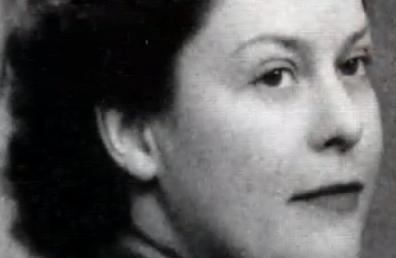The dramatic music, blue-tinged reconstructions and menacing voiceover all suggested that we should be sceptical of World War Two heroine Vera Atkins. The title of the programme indeed, Secret War: The Spymistress and the French Fiasco, told us how we should feel. We know that she was a brave member of the Special Operations Executive, the British department responsible for secret agents in occupied lands, but thankfully this programme came along to debunk her. Or did it?
It certainly intended to. The story of how Atkins, a senior operator in charge of the F Section, which ran missions in France, colluded with her boss in ignoring his incompetence is not edifying. Her boss, Maurice Buckmaster, misinterpreted a signal from an agent in the field which suggested the Nazis had taken control of the wireless set. Atkins did not report him, and this failure allowed the Germans to manipulate drops of supplies and arms and resulted in hundreds of deaths.
One of Atkins's female agents, luckily still around, told the camera that she had been captured by the Nazis and sent to a concentration camp, a fact only revealed to Atkins after the liberation of France. The agents being dropped into France (see David Hare's Plenty) stood no chance thanks to Atkins's cover-up, although it hardly seems fair to blame her entirely. (Britain didn't even acknowledge it used female agents, thus none were listed as missing after the war.)
What makes her role more interesting is that she was herself behind enemy lines: she was in fact a Romanian Jewish refugee, thus technically an illegal alien from a country at war with Britain. Her application for British citizenship could have been derailed by Buckmaster, the programme says, if she crossed him. Worse than this, Atkins had apparently bribed Germans in Holland not to deport some of her family to concentration camps, and potentially offered to supply information to them. We are told by her biographer that there is evidence of this, but none is presented, so we have to take it on trust.
There is a traditional filmic narrative of redemption here; the narrator says, "She was looking not just for her agents - but for atonement," when, towards the end of the war, Atkins took off into Germany on a desperate mission to discover what had happened to some of her "girls". This course took her to the revelation that many had been killed, some at the Natzweiler camp, which sounded particularly horrendous. (Three of her agents were injected with carbolic acid, and one may have been burnt alive.) In all 117 agents were killed because the Germans had intercepted Allied communications.
But the lesson I took from Secret War was not that Vera Atkins was a wicked woman who doesn't deserve the reputation she has - no doubt her actions were foolish and far, far worse - but that a state of war places us all in terrible positions, where our normal failings are magnified and everything comes at a much higher cost.
Atkins, given terrible choices between saving her family and possibly leaking information to Germans or between being deported and covering up a superior's mistake, surely chose wrongly that 117 people died (not solely on her account, of course), but the programme does not have the sympathetic wit to understand that. It seems interested in dirtying a reputation, not understanding what war does to people.
- Find Secret War on Yesterday
 Find books about World War Two on Amazon
Find books about World War Two on Amazon















Add comment